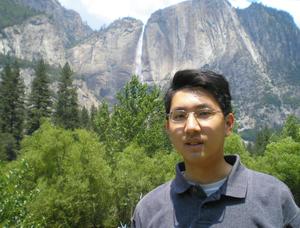ESP Biography
ALBERT CHEN, Stanford Graduate Student, Electrical Engineering
|
Major: Electrical Engineering College/Employer: Stanford University Year of Graduation: G |

|
Brief Biographical Sketch:
I'm a Ph.D. student in the Department of Electrical Engineering at Stanford University. I was born in Columbus, Ohio, but grew up in New York and Michigan. I attended college at the University of Michigan at Ann Arbor, where I spent three interesting years, and graduated with a B.S.E. degree in Electrical Engineering. Subsequently, I moved to California and enrolled as a graduate student at Stanford University. I received the M.S. degree in electrical engineering in January 2008. I'm now a Ph.D. candidate working on radar remote sensing using digital signal processing and electromagnetic modeling techniques under Prof. Howard Zebker. Past Classes(Clicking a class title will bring you to the course's section of the corresponding course catalog)M704: Infinite Series in Splash! Spring 2010 (Apr. 17 - 18, 2010)
An infinite series is a sum of infinitely many terms. We will explore the circumstances under which an infinite series can have a well-defined (non-infinite) sum. We will explore how Taylor series and Fourier series can be used to approximate complicated functions. In the process, we will show how modern computers can compute many quantities using only the four basic operations of addition, subtraction, multiplication, and division.
E535: Imaging Systems: Using electromagnetic waves and mathematical algorithms to take pictures in Splash! Fall 2009 (Oct. 10 - 11, 2009)
In this class, we discuss how electromagnetic waves and mathematical algorithms are used to design modern imaging systems. We discuss how to characterize imaging system performance. We will start with the well-known digital camera, and then discuss more advanced optical imaging systems, such as telescopes and adaptive optics systems. We then examine how microwave radars can image the Earth from outer space, and discuss how CT and MRI systems form images of the human body. Along the way, we will explore some advanced mathematical topics, such as vector calculus and Fourier Transforms, and see how these tools are applied in the design of imaging systems.
|
|
